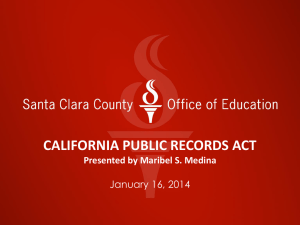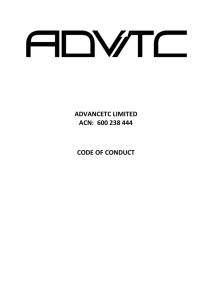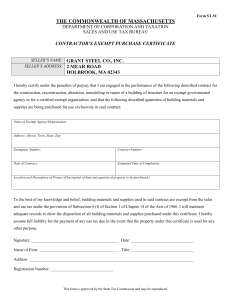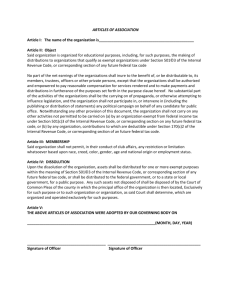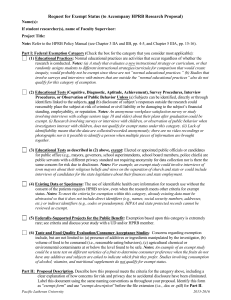GEORGIA SUNSHINE LAWS HANDBOOK
advertisement
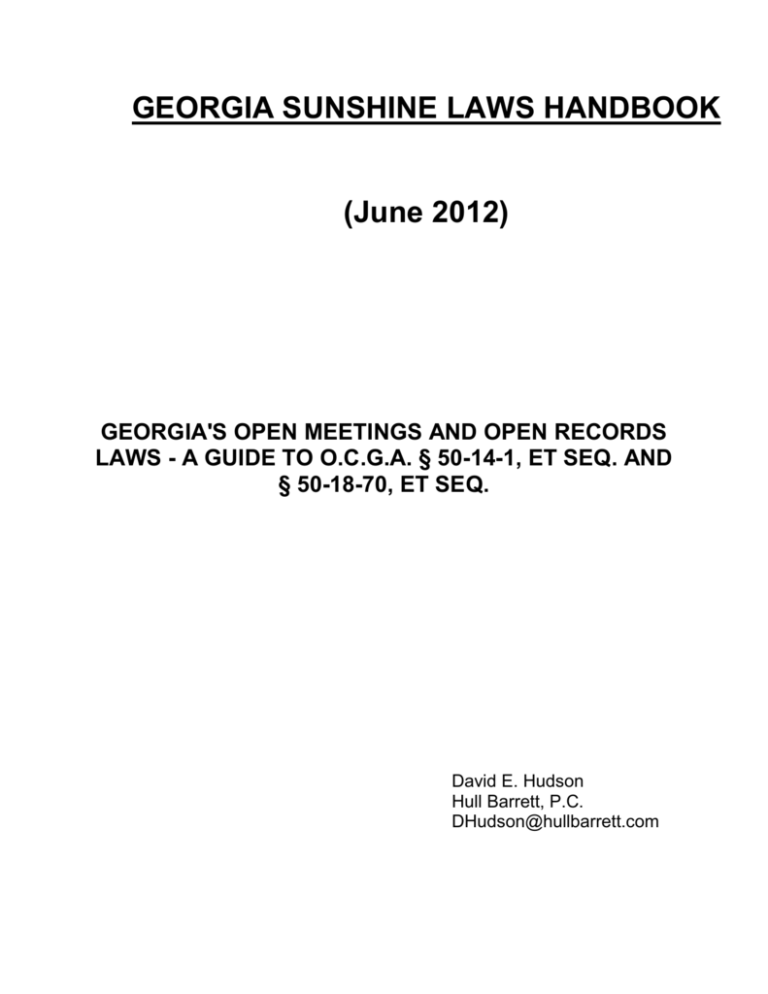
GEORGIA SUNSHINE LAWS HANDBOOK (June 2012) GEORGIA'S OPEN MEETINGS AND OPEN RECORDS LAWS - A GUIDE TO O.C.G.A. § 50-14-1, ET SEQ. AND § 50-18-70, ET SEQ. David E. Hudson Hull Barrett, P.C. DHudson@hullbarrett.com GEORGIA SUNSHINE LAWS HANDBOOK 6/12 Update GEORGIA'S OPEN MEETINGS AND OPEN RECORDS LAWS - A GUIDE TO O.C.G.A. § 50-14-1, ET SEQ. AND § 50-18-70, ET SEQ. TABLE OF CONTENTS I. Must Government Officials Answer Questions? .......................................................... 2 II. Meetings ............................................................................................................... 2 What meetings are open? .................................................................................... 2 What meetings can be legally closed or are not covered by the Act? ................... 2 Notice of meetings. ............................................................................................... 4 Meeting agenda and minutes. .............................................................................. 4 Conduct in, and affidavits of closed meetings....................................................... 4 Meetings by telephone. ........................................................................................ 5 Voting at meetings. ............................................................................................... 5 How to protest an illegal meeting.......................................................................... 5 Remedies for violations. ..................................................................................... 5 III. Records ................................................................................................................ 6 Public policy favors openness. ............................................................................ 6 What records are open? Time to respond? ......................................................... 6 How and when are records to be produced? Costs? ........................................... 6 What records are not open? ................................................................................. 8 Other exceptions that allow non-disclosure ........................................................ 13 Remedies. § 50-18-73 and § 50-18-74 .............................................................. 14 Communications with the Office of Legislative Counsel ..................................... 14 Vital records and exempt material ...................................................................... 14 I. ANSWERING QUESTIONS Georgia law does not require public officers or employees to answer questions from the press or the public. Often times it would be a political mistake if they do not. What the law does require is that the public be given access to information through open meetings and open records as discussed in the following. II. MEETINGS WHAT MEETINGS ARE OPEN? The law applies to every state, county or municipal department, agency, board, bureau, commission or authority. It applies to every city, county or regional authority, including development and hospital authorities. These applications include any committee of its members created by any of the above authorities. It also applies to private entities that carry out the functions of a public agency, e.g. private companies which take over the operations of public hospitals. It applies to personnel board hearings (except for deliberations), Tax Equalization Boards, and to coroner's inquests. It also applies to any non-profit organization that receives at least a third of its funds from state or local tax revenues. § 50-14-1(a). The 2012 amendments expand committees that are subject to open meeting requirements. Now any committee created by a public agency is subject to the requirements of notice and admission of the public. O.C.G.A. § 50-14-1(a)(3)(A)(ii). Meetings occur when by prior arrangement there is a quorum of the members of a governing body or agency or of any committee of its members, and public business is discussed or presented. See O.C.G.A. 50-14-1. WHAT MEETINGS CAN BE LEGALLY CLOSED OR ARE NOT COVERED BY THE ACT? A governmental agency is not required to close any meeting; however, it may vote in public to close a meeting and continue in executive session for the following: (a) ---The new law now allows meetings to be closed for the discussion of the acquisition or disposal of real estate, and to discuss settlements of lawsuits or claims against an agency. Nonbinding votes may be taken in a closed meeting. However, no vote on such matters shall be binding until the issue is disclosed in an open meeting and a vote is taken in an open meeting. § 50-14-3(b)(1). (b) ---Interview prospective employees and discuss personnel matters. Under the new law, agencies may interview prospective employees for the “position of executive head of an agency” in a closed session. However, this is limited only to high end level positions of “executive head.” This would likely include positions such as a school superintendent, city manager, county manager, but not lesser positions such as 2 department head, principal, athletic director or football coach. The law also continues the exception that allows evaluations and discipline of public officers or employees to be discussed in a closed session. Any action taken on such personnel matters must occur in an open meeting. Meetings to discuss agency policies that impact employees in general must be open. The new law strengthens the requirement that a meeting may not be closed when evidence or argument is presented on a personnel matter. O.C.G.A. § 50-14-3(b)(2). (c) ---Privileged consultations with an attorney regarding pending or potential legal action or claims. A pending claim requires actual notice of threatened legal action. However, a meeting with an attorney to discuss the legality of closing a meeting must be open. Also a privileged meeting with counsel is not allowed if persons are present who are not the attorney or client. O.C.G.A. § 50-14-2(1). (d) Exempt documents involved. ---An agency may also vote to close meetings where discussing documents the disclosure of which are exempt under the Open Records Act. An example would be documents relative to security plans against terrorist threats or criminal activities. O.C.G.A. § 50-14-2(b)(4). (e) ---Also, the State Board of Pardons and Paroles may close its meetings while deliberating or voting, or if the board determines that witnesses would be at risk if the meeting was open. § 50-14-3(a)(2). (g) ---Staff meetings held for investigative purposes as required by law may be closed, as well as meetings of the Georgia Bureau of Investigation or other law enforcement bodies; adoption proceedings; and hospital authority meetings when discussing the awarding or revocation of staff privileges, or the granting of abortions. § 50-14-3. Hospital Authorities may also discuss competitive plans and strategies in a closed meeting. O.C.G.A. § 31-7-75.2. (h) ---When an agency conducts an inspection of physical facilities under its jurisdiction. § 50-14-1(a)(B). (i) Inter-government meetings and social gatherings. ---When an agency meets with other government officials; e.g., attending conventions or meetings, or when traveling to such a meeting, or when attending a social or ceremonial event. § 50-14-1(a)(B). (j) ---Mediation of lawsuits or claims. However, documents pertaining to any settlement are open records. § 50-14-3(a)(5). ---Note: The General Assembly is exempt from provisions of the Open Meetings Act. See O.C.G.A. 15-14-13. 3 NOTICE OF MEETINGS (a) The regular time and place of agency or committee meetings shall be posted at least one week in advance and in a conspicuous place at the regular meeting place, and also on the agency’s web site, if any. § 50-14-1(d). (b) Special meetings: When a meeting is held other than at the regular scheduled time and place, written or oral notice shall be given at least 24 hours in advance to the legal organ newspaper or to a newspaper of general circulation. If the agency meets in a county where the legal organ newspaper is published less than four times weekly, any newspaper or broadcaster in the county may request in advance to be notified verbally or by fax or email at least 24 hours in advance of a called meeting. When notice is given to a newspaper, it must share that information with any member of the public who makes inquiry. Upon written request in advance, the agency must provide a copy of the agenda along with notice of the special meeting. § 50-14-1(d)(2). (c) Emergency meetings: When special circumstances require a special meeting with less than 24 hours’ notice, reasonable notice must be given under the circumstances including notice to the legal organ newspaper or a newspaper with general circulation in the county. The notice shall specify the reason why the meeting is held with less than 24 hours’ notice. Such notice, if requested within the previously calendar year, must be given by telephone, fax or email to a requesting media. MEETING AGENDA AND MINUTES The law requires an agency to post and make available upon request “an agenda of all matters expected to come before the agency at such meeting.” The agency can take up a matter not on the agenda if it “becomes necessary.” § 50-14-2(a). The new law requires the keeping of minutes of closed meetings but they do not become public unless the agency consents or ordered by a court. § 50-14-1(e). The minutes of a regular meeting become public when approved at the next meeting. A summary of a regular meeting must be available to the public after two business days. O.C.G.A. § 50-14-1(e). CONDUCT IN, AND AFFIDAVITS OF CLOSED MEETINGS When a meeting of a public agency is closed, the presiding person, or each member of the agency attending if so provided by the agency’s policies, shall execute an affidavit attesting that the subject matter of the closed portion of the meeting was devoted to exceptions provided by law and identifying the specific section. § 50-14-4(b)(1). If a person initiates a discussion that is not permitted in a closed session, the presiding officer must rule the discussion out of order. If one or more persons attempt to continue 4 such discussion, the presiding officer shall immediately adjourn the executive session. § 50-14-4(b)(2). MEETINGS BY TELEPHONE Governing boards, agencies, or committees with statewide jurisdiction may hold telephone conference call meetings, providing that public access is assured and the public notification provisions of the statute are followed. Also, the new law now allows local government telephonic meetings in emergencies, and also allows an absent member in limited circumstances to participate in a regular meeting by telephone. § 5014-1(f). For a statewide agency, notice must be given of the place where the public can access the telephonic meeting. § 50-1-5. VOTING AT MEETINGS The amendments to the law now make it clear that votes must be public and that the minutes must reflect the persons making and seconding motions and the name of each member voting for or against a proposal. § 50-14-1(b) and § 50-14-2(e)(2)(B). HOW TO PROTEST AN ILLEGAL MEETING Closing a meeting to continue in executive session requires a majority vote of the quorum present. The names of those members voting to close and specific reasons for closure must be entered upon the official minutes, and those minutes must be made available to the public. If you believe that a governing board or agency is illegally closing a meeting, tell them so. State that the Open Meetings Law, Section 50-14-1 of the Georgia Code, requires that the meeting be open. Ask them to cite the exemption under which they are closing the meeting. If, despite your objection, the meeting is closed, then file a protest in writing or send a demand letter to the governing agency or board. Demand access to a transcript or minutes of the closed meeting and access to future meetings. State why the meeting was unlawful. See O.C.G.A. 50-14-4. REMEDIES FOR VIOLATIONS Any action taken at an illegally held meeting is not binding if it is challenged in court within 90 days of discovery of the violation. § 50-14-1(b)(2). If a lawsuit is brought to challenge a legally closed meeting, and the challenge is successful, a court shall award reasonable attorney fees if it finds that the agency’s actions were “without substantial justification.” § 15-14-5(b). Criminal penalties for willful violations of the Act are increased to $1,000.00 for the first offense and $2,500.00 for the second offense. Also a $1,000.00 civil penalty can be assessed against an agency or any person who “negligently” violates the Act. § 50-14-6. 5 The Georgia Attorney General is given authority to enforce the Act through either civil or criminal proceedings. § 50-14-5(a). III. RECORDS PUBLIC POLICY FAVORS OPENNESS In the 2012 legislation, a strong statement of public policy in favor of open records has been added. The statement further reinforces that there is a “strong presumption that public records should be made available for public inspection without delay” and that the Act should be “broadly construed to allow the inspection of government records.” All exceptions are to be “interpreted narrowly” so as only to exclude the portion of a record covered by an exception. § 50-18-70 and § 50-18-72(b). WHAT RECORDS ARE OPEN? TIME TO RESPOND? "All documents, papers, letters, maps, books, tapes, photographs, computer based or generated information, or similar material prepared and maintained or received in the course of the operation of a public office or agency" are public records. § 50-18-1. Agencies must have record retention policies as required by § 50-18-90, et seq. Public records also include these items when they are received or maintained by a private person or entity on behalf of a public office or agency and that are not otherwise subject to protection from disclosure. § 50-18-70(a)(2). HOW AND WHEN ARE RECORDS TO BE PRODUCED? COSTS? (a) Three days. Agencies must produce records “within a reasonable time not to exceed three business days” after a request. NOTE: If an agency has designated a person to receive written requests, the three days do not start until receipt by that person. O.C.G.A. § 50-18-71(b)(2). (b) Partial production. If all the records cannot be produced within three days, those that can should be. § 50-18-71(b)(1). (c) When more than three days are required. If the agency cannot respond within three days, it shall within three days describe the records and provide a timeline for production which shall be as soon as practicable. § 50-18-71(b). (d) Oral or written request. The law allows requests to be made orally or in writing. An agency may designate a person or office to receive written requests: a director, chairperson, chief executive or other senior official, or a designated records custodian or open records officer. Such a person must be designated, too, at each satellite office of an agency. The absence of the designated person does not extend the time for a response. § 50-18-71(b)(1)(B). 6 A written request must be used to enforce compliance under the remedies provided at §s 50-18-73 and 50-18-74. § 50-18-71(b)(3). (e) Denial of requests. An agency must give notice within three days of the specific code section, subsection and paragraph the agency relies on to deny the request. (f) Copying must be allowed. A member of the public may use portable devices brought to an agency office to make copies. However, the agency may elect to provide the copies itself when it elects to redact confidential information. § 50-18-71(b)( )(B). (g) Designated open records officer. When an agency designates a certain person as the open records officer to receive requests, it must disclose the person designated to anyone that requests that information. Also the agency must notify the legal organ in the county of the agency’s principal office and post it on the agency web site. (h) Requests by email/fax. An agency must permit written requests by email or facsimile if the agency uses either in the normal course of its business. § 50-1871(b)(2). (i) Costs for records. The new law specifically makes clear that redaction charges may be imposed in addition to search and retrieval costs. The agency must use the “most economical means reasonably” available. It must use the lowest paid full-time employee with the skill and training to perform the work, and the first fifteen minutes is free. Copying costs are reduced to $.10 per page for regular size documents and to actual cost for others. For electronic records, an agency may charge the cost of the media on which the information is produced. § 59-18-71(c)(2). A city or county may set fees for a geographic information system. § 50-29-2(a). (j) Collection of costs. When a person has requested copies and does not pay the cost incurred by the agency, the agency may collect those charges in any manner authorized by law. O.C.G.A. § 50-18-71(c)(3). If the costs are to exceed $25.00, the agency must notify the requester in advance and may defer production until the requester has agreed to pay these costs. If costs are projected to exceed $500.00, the agency may require payment in advance. Also an agency may require prepayment for a requester who has not paid previous costs. § 50-18-71(d). (k) Records for litigation. Litigants may request documents under the ORA but must do so in writing and copy opposing counsel. § 50-18-71(e). (l) Electronic records. Use of electronic record keeping cannot be used to reduce public right of access. An agency shall comply with the requester for electronic copies or printouts of electronic records. Electronic records cannot be denied because of the 7 requirement to input commands if those commands or instructions are used by the agency in the ordinary course of its business. Electronic records can be requested in the format in which they are kept or in ASC II format. § 50-18-71(e). (m) Email messages. A request for email messages shall provide, if known, name, title, office and specific dates or data bases for the agency’s search. § 50-18-71(g). (n) Option to produce records online. An agency may provide records by access to a web site accessible to the public. This option may not be used to decline to produce a request for electronically stored data fields. § 50-18-71(h). (o) No obligation to prepare reports. An agency shall not be required to prepare reports, summaries or non-existent compilations in response to a records request. § 50-18-71(j). WHAT RECORDS ARE NOT OPEN? Most exceptions to open records are contained in § 50-18-72(a). They are as follows: (1) Other laws. Records exempted by federal statute or regulation. (2) Medical or veterinary records the disclosure of which would invade personal privacy. (3) Law enforcement records. Records may be withheld if they would likely disclose the identity of a confidential source, confidential investigative or prosecution material which would endanger the life or physical safety of a person, or the existence of a confidential surveillance or investigation. (4) Law enforcement investigation records/initial reports. Records in a pending investigation or prosecution may be withheld. However, initial police arrest and incident reports are public. Also, this exception does not apply to records in the possession of an agency that is involved with a pending investigation or prosecution. (5) Motor vehicle accident reports and other driving records. These are generally exempt from disclosure. However, a provision is made for production to a media organization upon the receipt of a writing verifying that the request is made for the purpose of gathering information for news reporting. Other than initial arrest reports, incident reports and records of criminal investigations, Department of Motor Vehicle records on individual drivers are exempt from disclosure. § 40-5-2(b) and 18 U.S.C. § 2721. (6) Jury list data and personal identity information on jurors. See also § 15-12-11(c). 8 (7) Confidential evaluations and exams for potential employees. Outside confidential evaluations submitted to a government agency as well as examinations prepared by a government agency in connection with employee hiring are confidential. (8) Employee investigations. These records are exempt until ten days after the results have been presented to the agency or an officer of the agency or the investigation is otherwise concluded or terminated. (9) Real estate valuation records and studies. Appraisals and feasibility studies relative to the acquisition of real property are exempt until the transaction has been closed or terminated. (10) Bids and cost estimates. These are exempt from disclosure until the contract is awarded or terminated or the agency takes a public vote regarding a bid or proposal. (11) Hiring of executive heads of an agency. Records which would identify a person being considered for employment as “executive head of an agency” may be withheld until fourteen days prior to the vote or action to make the hiring. In the case of the hiring of a president of a unit of the University System of Georgia, such documents may be withheld until five days before the vote to hire. Also, the documents disclosed may be limited to as few as three finalists under consideration. Also, prior to release of the documents the agency may give a finalist an opportunity to withdraw and be replaced by another person under consideration. If the agency conducts interviews and discussions on the hiring in open meetings, an agency may vote to hire or appoint without a period of delay. Agencies shall furnish at any time on request any compilation regarding applicants by such factors as race and sex. The requirements of this section may not be avoided by allowing a private person or agency to assist with the hiring or search process. (12) General Assembly staff. Documents provided by staff offices to members of the General Assembly are exempt unless released by a member of the General Assembly. (13) Historical research records. Records with historical research value given to public libraries or the Board of Regents and where the donor wishes to restrict access for a period of not more than seventy-five years. This exception does not apply to records of the operation of state or local governments in Georgia. (14) Department of Natural Resources historic property records. If DNR determines that nondisclosure is necessary to reduce the risk of harm or theft, records of the inventory and location of historic properties may be withheld. 9 (15) Farm water use. The records of water use by individual farms are exempt from disclosure. However, water use records for watersheds without revealing individual users are public. (16) Department of Agriculture critical food system records. Records considered by the Department to be a part of critical infrastructure necessary to protect public health, safety and welfare may be withheld. (17) National animal identification system. Department of Agriculture records created as a part of the national animal identification system may be withheld. (18) Rare species of plants and animals. DNR records regarding the location of sensitive habitats for plants and animals may be withheld if necessary to prevent the risk of harm, theft or destruction. Owners of property where the species are located may obtain the records. (19) Neighborhood watch or public safety programs. Records that reveal the identity of persons and addresses involved in neighborhood watch or public safety programs are exempt. (20) Private identity information. Parts of records that would reveal a person’s social security number, mother’s name, credit card information, bank account information, utility account number, passwords, insurance or medical information, unlisted telephone number, email address, cell phone number, date and month of birth or utility accounts are to be redacted. An exception is provided if an affidavit is provided by a news media that the information is sought for news gathering and allows access to social security numbers and birth date. The law provides that such personal identity information may be obtained from court records, or when application is made to a court and “good cause” for access is shown. (21) Private identity information for public employees. The same categories of information as listed for paragraph (20) above may be withheld from records of government employees. However, this exception does not apply to public records that do not specifically identify the individual as a public employee. Also, the 2012 amendments provide that there is no media exception to obtain social security numbers and birth dates for public employees. (22) Department of Early Care and Learning. Records that would identify children under this program are exempt. (23) Electronic signature. Records that would disclose electronic signature information is exempt. 10 (24) Carpooling or ride share information. Records that would identify the participants are exempt from disclosure. (25) Security documents. Documents are exempt which would disclosure security arrangements against sabotage, crime or terrorist act if necessary “for the protection of life, safety or public property.” Included are records of government training programs that would identify persons being trained or instructors. Courthouse security plans are also confidential under § 15-16-10(a)(10). (26) 911 emergency phone records. Personal identity information may be redacted “if necessary to prevent the disclosure of the identity of a confidential source, to prevent disclosure of material which would endanger life or the safety of any person, or to prevent disclosure of a confidential surveillance or investigation.” (27) Children in athletic or recreational programs. The identity of children under the age of 12 in such programs may be redacted. (28) Toll road records. These may be redacted if they would reveal the travel history of any individual motorist. (29) Donor information to public colleges and universities. Information that would identify individual donors or potential donors may be redacted unless the individual does business with the institution in excess of $10,000.00 per year. (30) MARTA travel records. Records of individual travel via a Transcard or Smartcard or similar system may be redacted. (31) Building mapping information for security purposes. Building mapping information under O.C.G.A. § 38-3-150, et seq., may be withheld. (32) Evidence of pornography. Physical evidence and investigatory materials of child pornography may be withheld. (33) Retirement system investment records. Records that would reveal investment details and procedures for transfer of funds may be withheld. Also documents pertaining to alternative investments may be withheld. (34) Trade secrets. Trade secrets that a person or business is “required by law” to submit to an agency may be withheld. When the records are submitted, the person or entity must submit an affidavit that the records constitute trade secrets. Thereafter, if an agency is requested under the ORA to produce the documents, it must give notice to the entity that submitted the documents. An entity that submitted the documents has ten days to seek to prevent disclosure by court action. If the agency agrees that the 11 documents are trade secrets, then the requester of records may file a court action to obtain access. (35) University research and proprietary documents. Documents from a public university constituting research on commercial, scientific, technical or scholarly issues may be withheld until the information is released, published, copyrighted or patented. (36) Additional research data. Records developed, collected or received by institutions of higher education, whether alone or in conjunction with a supporting public or private entity, may be withheld until the information is published, patented or otherwise disseminated. The confidential information shall include information provided by participants in the research. (37) Student records under FERPA. Records that cannot be disclosed under FERPA or which would jeopardize the receipt of federal funds under FERPA are exempt from disclosure. See 20 U.S.C. § 1232g. (38) Testing data. Questions, scoring material and other documents necessary for tests to be properly administered by academic institutions are exempt from disclosure. (39) Participants in health studies. Documents that would disclose the identity of persons participating in studies by the Department of Community Health, the Department of Public Health, the Department of Behavioral Health and Development Disabilities are exempt from disclosure. (40) Firearm licenses. Records maintained by the Probate Court for carry licenses or other documents relative to the possession of firearms are exempt from disclosure. (41) Attorney client privileged documents. Documents within the attorney-client privilege recognized in Georgia are exempt from disclosure except that factual findings by an agency lawyer conducting an investigation for the agency are open records unless the investigation pertains to pending or potential litigation, claims or administrative proceedings. Investigations conducted by an attorney for a hospital authority to ensure compliance with state or federal law are exempt from disclosure. Attorney-client communications may be discovered in a court case challenging an agency’s failure to comply with the Open Records Act. A judge in such a case may inspect the claimed attorney-client communications in private in order to make a decision. (42) Attorney work product documents. Attorney work product documents are subject to the same provisions as stated above for attorney-client privilege documents. 12 (43) Tax information. Records with tax information made confidential under state or federal law may be withheld. (44) Computer software information. The computer programs or software used by an agency in the operation of its office are exempt from disclosure, but not the data contained on the program or software. (45) Insurance rating data. Proprietary insurance underwriting information is not subject to disclosure. Also, documents in the investigations of certain insurers are confidential under § 33-2-8.1(c). (46) Department of Economic Development documents. A new exception allows the Department to withhold documents on a project valued at more than $25M or involving fifty or more employees until the Department has secured a “binding commitment” or the project has been terminated. However, within five days after the binding commitment, and if the Department has committed to use state funds, the Department must post a notice of the project on its web site and by publishing notice of the project and the parties in the legal organ of each county where the project is to be located. (47) Job training records. For an Economic Development project as described in paragraph (46) above, until a binding commitment has been secured, Quick Start Training Program records that would identify job applicants or proprietary hiring practices, training, skills or business methods of a private entity may be withheld. OTHER EXCEPTIONS THAT ALLOW NON-DISCLOSURE Courtroom exhibits. Courtroom exhibits are not open to public inspection unless permitted by the judge. If inspection is not permitted, the custodian of the exhibit shall provide a photograph, photocopy, facsimile or other reproduction. Physical evidence of child pornography shall not be allowed for public inspection unless ordered by a court. The judge shall provide in a written order the terms and location for inspection and a prohibition against any copying or photographing of such material. A violation is a felony. § 50-18-72(c) and (d). Cable service provider franchise fees. Documents of gross revenues and other records provided to local governments by cable or video operators are confidential. O.C.G.A. § 36-76-6(d). Public hospital records and records of the Composite Medical Board. Commercially valuable plans, proposals or strategies of competitive advantage to a public hospital may be withheld until approved or rejected by the governing board of the hospital. § 317-75.2. Documents regarding investigations by the Georgia Composite Medical Board are confidential under § 43-34-7. 13 Physician peer review records are confidential under § 31-7-133. Telephone and telegraph company eminent domain documentation. Certain documents provided to a local government in connection with the exercise of eminent domain by a telephone or telegraph company shall be confidential under § 46-5-1(b)(13). REMEDIES. § 50-18-73 and § 50-18-74. (a) The Superior Courts have jurisdiction to enforce the provisions of the Act, and the Attorney General may enforce the Act by civil or criminal litigation. (b) In any litigation over the Act, if either party acts without substantial justification, the court shall award attorney’s fees to the prevailing party. (c) Any agency or person who provides access to information in good faith shall have no liability. (d) A person or entity who knowingly and willfully violates the Act can be punished by a misdemeanor with a fine up to $1,000.00 for the first violation and $2,500.00 for a second violation. (e) In addition, a court may impose a $1,000.00 civil penalty against a person who “negligently” violates the Act. For a second violation within twelve months, the court may impose a $2,500.00 penalty. (f) A person or entity who destroys records to prevent disclosure under this article may be prosecuted under § 45-11-1 (felony with imprisonment from 2-10 years). (g) A prosecution for violating the Open Records Act shall only be commenced by the issuance of a warrant as provided in § 17-4-40(c) by a judge of the Superior or State Court, or a judge of Probate Court. COMMUNICATIONS WITH THE OFFICE OF LEGISLATIVE COUNSEL Such communications between legislative counsel and members of the General Assembly, the Lieutenant Governor, and persons acting on their behalf are privileged and confidential. The privilege may be waived by any of these public officers. VITAL RECORDS AND EXEMPT MATERIAL If any exempt matter is contained in a document required to be filed as a vital record, it shall be confidential even though it is in the possession of a judge or clerk of court prior to filing with the Department of Public Health. David E. Hudson DHudson@hullbarrett.com 14
